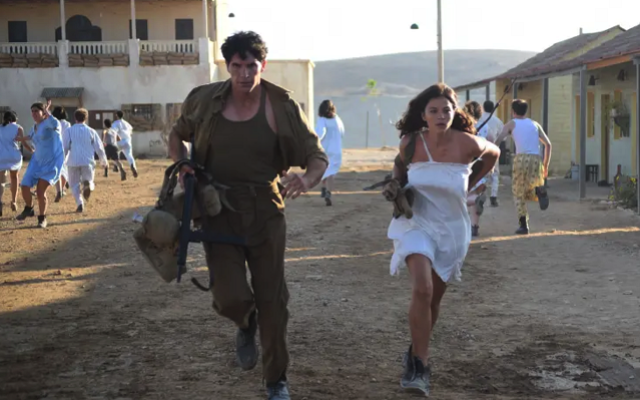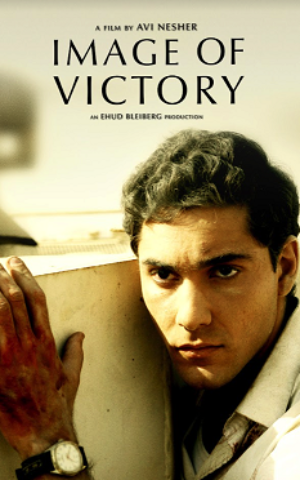Netflix Brings Back Israeli Drama ‘Image of Victory’
Outstanding AJFF choice from earlier this year is a masterful study of Israel War of Independence.

Viewers who missed the Israeli film “Image of Victory” at this year’s Atlanta Jewish Film Festival — by veteran director and screenwriter Avi Nesher — have another chance to catch the award-winning production on Netflix, beginning July 15.
The film, which was nominated for 15 Ophir Awards and was shortlisted at the AJFF for Best Narrative Film, is a powerful anti-war drama built around a story set during Israel’s War of Independence.
The story is based on the defense, in June 1948, of the small kibbutz Nitzanim. The kibbutz, which was established along the southern coast of Israel between Ashdod and Ashkelon, was at that time an isolated and sparsely defended Israeli outpost of about 150 residents — an easy target for the Egyptian Army.
Drawing on all of Nesher’s considerable talents as one of Israel’s best filmmakers, the film tells the story of the defense of the kibbutz through the eyes of two key players on opposite sides of the war.
The Israeli lead, Joy Rieger, gives the performance of a lifetime as a no-nonsense, passionate and independent young mother and wife who has fallen out of love with her husband. Her existential commitment to the settlement drives the relentless focus of the film on the effort of the young residents to survive what seems like certain doom.

Nesher has populated the kibbutz with a lively and realistic cast of characters, several of whom have survived the Holocaust only to come face to face with new dangers.
Despite its strong statement on the futility of war, the youthful idealism that suffuses the defense of the beleaguered outpost — with its frequent references to the Holocaust — are a vivid reminder of what motivated so many young heroes during Israel’s War of Independence. It is also a reminder, to those who may have forgotten, of the sacrifices made by the nation’s founders.
On the opposite side is an equally young and sophisticated Arab journalist from Cairo who is covering the siege of the kibbutz with a newsreel cameraman.
With his tailored suits and connections to Cairo’s elite, he is no ordinary Arab reporter, but a fictional stand-in for the legendary Egyptian editor, writer and journalist Mohamed Hassanein Heikal, who, in 1948, was on the verge of a career that will make him for over 50 years one of the most influential voices in the Arab world.
Because of legal restrictions, the film drops any direct mention of Heikal. Here, the character is simply named Hassanin. And, although there is no historical evidence that Heikal participated in the siege of Nitzanim, this handsome, dashing and fascinating character serves as Nesher’s voice for the Arab side of the story. Hassanin is played by the Arab Israeli actor Amir Khoury, who has also been featured in the Israeli television hit “Fauda.”

Hassanin’s task in the film is to provide a so-called image of victory for King Farouk’s corrupt and self-serving regime in Cairo — an assignment he struggles to complete as he begins to understand the impact that the war is having on ordinary Palestinians.
Nesher’s skill in crafting this absorbing narrative and the complex portrait he creates of the Arab journalist is just part of the story.
While Hassanin may have had second thoughts about the futility of the Egyptian cause during Israel’s War of Independence, there is no question that in real life, Heikal was a fervent supporter of the 1952 Egyptian revolution that deposed King Farouk. From that point forward, he was a critical component of Gamal Abdel Nasser’s relentless campaign to encircle the Jewish state using his own version of Pan-Arab nationalism.
The film is successful in dramatizing Hassanin’s thoughts, but it gives short shrift to the immense power he would later wield as a propagandist and political insider.
Ironically, Heikal continued to craft images of victory for decades, even after Egypt’s crushing defeat by Israel in the 1967 Six-Day War, in which Egypt lost 12,000 troops in less than a week and had 5,000 more captured in the rout. Its military lost eighty percent of its hardware during the war, much of it destroyed by Israel’s air force in the early stages of the campaign.
Heikal would go on to write a speech for Nasser that described the military catastrophe as a “setback” and helped to rally support for the Egyptian dictator.
Later, he became Minister of Information and National Guidance under Nasser. Until his death in 2016, at the age of 92, Heikal remained an implacable foe of the peace treaty between the two nations initiated by Egyptian President Anwar Sadat.
Still, Nesher’s film is a powerful statement about how images of victory have been used to shape the national consciousness on both sides — one that persists in many cases to this day.



comments